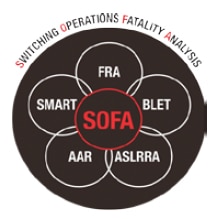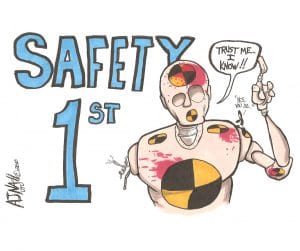
In the safety alert, SOFA warned, “the SOFA Working Group is concerned by the 159 injuries that occurred this year through August 31, 2020, and reminds all employees to remain vigilant during switching operations by not only protecting the shove movement, but also protecting themselves by avoiding close or no clearance hazards. Last, but not least, remember to always hold a job briefing whenever the job or situation changes.”
Click here to read the full safety alert.
In their “SOFA Lifesavers – Why Job Brief?” notice, SOFA details the importance to perform job briefings and points out that one in five switching operations fatalities lacked an adequate job briefing.
Click here to read SOFA Lifesavers – Why Job Brief?
The Switching Operations Fatality Analysis working group was formed by the Federal Railroad Administration in the early 1990s in an effort to analyze switching accidents and prevent future accidents and fatalities. The group consists of representatives from the FRA, labor and management.
Click here to visit SMART-TD’s SOFA page where these and other SOFA documents are available.
Tag: SOFA

SOFA reported a total of 17 severe injuries for the fourth quarter, bringing 2018’s annual total to 68. Of those severe injuries reported in the quarter, one resulted in amputation. None of the incidents were fatal.
For the year, there were eight amputations. When combined with the first three SOFA quarterly reports, the group counted three switching-related fatalities in 2018. SMART TD had seven member fatalities last year.
In 2017, SOFA reported 68 severe injuries and nine amputations.
Click here to see the full report.
A monthly report from the Switching Operations Fatality Analysis (SOFA) Working Group reported six severe injuries to railroad workers during May 2018, including one amputation.
SOFA Working Group defines a severe injury as FRA-reportable injuries to train and engine service employees that have a clear and verifiable diagnosis and meet one or more of the following four criteria: (1) potentially life threatening; (2) high likelihood of permanent loss of function, permanent occupational limitation, or other permanent disability; (3) likely to result in significant work restrictions; or (4) result from a high energy impact to the human body.
The amputation to a leg or foot occurred in Missouri when a worker was trying to cross on a moving car and fell from it at an industrial location.
Four of the other five severe injuries reported by SOFA were fractures that came as a result of falls, while the fifth severe injury was a fracture that came as the result of an alleged assault by a passenger.
The SOFA Working Group is a voluntary, nonregulatory railroad safety partnership consisting of representatives from SMART Transportation Division, the Brotherhood of Locomotive Engineers and Trainmen (BLET), Federal Railroad Administration (FRA), Association of American Railroads (AAR) and the American Short Line and Regional Railroad Association (ASLRRA) that has a goal of zero switching fatalities achieved through education and nonpunitive interactions.
Read an earlier story about SOFA’s first quarter report and its 2017 annual report.
Visit our SOFA page and read SOFA’s full reports.
The Switching Operations Fatality Analysis (SOFA) Working Group in June issued its latest updates on switching fatalities and severe injuries for the entirety of 2017 and for the first quarter of 2018.
According to SOFA, there were three switching-related fatalities and nine amputations as a result of switching accidents in 2017. There were 68 “severe injuries,” which SOFA defines as potentially life-threatening; having a high likelihood of permanent loss of function, permanent occupational limitation or other permanent disability; likely to result in significant work restrictions and resulting from a high-energy impact to the human body.
The number of severe injuries and amputations in 2017 exceeded 2016’s totals of 47 and seven, respectively.
SOFA reported that train accident reports increased to 1,686 in 2017 over the 1,671 in 2016. However, SOFA said that human factor accidents decreased to 639 in 2017 from the 643 reported in 2016.
In the first quarter of 2018, SOFA said there were two amputations, 20 severe injuries and no switching fatalities. SOFA reported that there have been 416 train accidents and 154 human factor accidents thus far in 2018.
SOFA is a voluntary, nonregulatory railroad safety partnership consisting of representatives of SMART Transportation Division, the Brotherhood of Locomotive Engineers and Trainmen (BLET), Federal Railroad Administration (FRA), Association of American Railroads (AAR) and the American Short Line and Regional Railroad Association (ASLRRA) that has a goal of zero switching fatalities achieved through education and nonpunitive interactions.
Click here to go to our SOFA page and read SOFA’s full reports.

In February 1998, a Switching Operations Fatalities Analysis (SOFA) working group, with representatives from the Federal Railroad Administration (FRA), labor and management, was formed at the request of the FRA to review employee fatalities and to develop recommendations for reducing fatalities in switching operations.
It is a voluntary, non-regulatory, workplace-safety partnership that looks for commonalities among the fatalities that occur during switching operations.
SOFA consultant Dr. David Skinner, who has been a part of working group since its inception, has compiled a summary notice to both railroads and rail crews currently experiencing winter-related conditions. The notice can be viewed here.
As the onset of winter is upon us, please take note of the following safety measures to help avoid a career-ending injury or loss of life during the winter months:
- Be sure winter clothing does not restrict movement, or degrade hearing and vision.
- Identify any winter-related conditions affecting safety. For example, ice can cause derailments. Ice, snow and mud can cause falling. Snow can muffle sound and reduce visibility.
- Adjust productivity expectations based on darkness and weather.
- Discuss winter conditions in safety briefings and post any weather-related concerns on bulletin boards.
- Do not lose situational awareness, no matter the other circumstances in your family or personal life.
Minnesota State Legislative Director Phillip Qualy (650) and Kansas State Legislative Director Ty Dragoo (1503) represent the SMART Transportation Division in the SOFA group.
“Please review the bulletin from Dr. Skinner and share that information with your fellow employees. It’s all about worker safety. The goal of SOFA is zero railroad fatalities,” Qualy said.
As always, keep in mind SOFA’s recommended five life-savers:
- Secure all equipment before action is taken.
- Protect employees against moving equipment.
- Discuss safety at the beginning of a job or when work changes.
- Communicate before action is taken.
- Mentor less experienced employees to perform service safely.
Representatives of the SMART Transportation Division’s Switching Operations Fatality Analysis Working Group (SOFA) urge railroad operating employees in northern states to exercise a heightened level of caution while working in late winter weather conditions.
Minnesota State Legislative Director Phillip Qualy and Kansas State Legislative Director Ty Dragoo remind all train crews to be aware of freezing and thawing of snowpack and muddy conditions within the coming weeks.
With a significant snowpack, the increasing angle of sunlight rays and evening hours that remain well below freezing temperatures, the risk of derailment is significant due to ice build-up in rail flange ways.
“Switchrod channels that do not drain or are not cleared of ice pose a risk for overexertion and injury. Light overnight snows can obstruct hazards and create unsafe walking conditions,” Qualy said.
“Train operating crews must not ride cars into permanent or temporary close-clearance areas under any circumstance. As an additional reminder, hooded winter clothing can affect hearing and block peripheral vision.”
“Federal Railroad Administration Chief Administrator Szabo recently recognized the accomplishments of SOFA,” Qualy said. “However, all credit goes out to each and every railroad worker in North America. It is astounding that we have not suffered a single SOFA fatality in more than one year. Our mission remains the same – zero fatalities.”
It is recommended that all SMART TD members review the SOFA working group’s Safety Posting for the first quarter of 2014 found here.
As always, in an effort to reduce injuries and fatalities, the SOFA Working Group asks that railroad employees practice the following five life-saving measures:
- Secure all equipment before action is taken.
- Protect employees against moving equipment.
- Discuss safety at the beginning of a job or when work changes.
- Communicate before action is taken.
- Mentor less experienced employees to perform service safely.
“As we approach the end of one of our worst winters in decades, we expect the railroads to clear hard crust snowpack from our yards, pick out switch-channels and sand walkways. We must anticipate and plan for the worst” said Qualy. “As train crews and members of the SMART TD, continue to be your brother and sister’s keeper for safety.”

The following message was sent to the UTU National Legislative Office from Federal Railroad Administrator Joe Szabo.
Friends,
I wanted to share with you a rail safety achievement from 2013 that really meant a lot to me. Last year, only one railroad employee died during switching operations.
As I wrote on the DOT blog, this is more than a statistic to me. What’s more, I know that all of my FRA colleagues share my view that one worker fatality is one too many.
But we’re moving in the right direction – and that’s largely thanks to the Switching Operations Fatality Analysis Group (SOFA) formed in 1998 with FRA, the Brotherhood of Locomotive Engineers & Trainmen, the United Transportation Union, the American Short Line and Regional Railroad Association, and the Association of American Railroads.
This is real proof that safety partnerships get results, serving our core goal of ensuring continuous safety improvement. With continued cooperation among SOFA’s stakeholders, I believe our ultimate goal of all rail workers returning home safely each day is now well within our reach.
Here’s another link to the blog: http://1.usa.gov/1iqYVta

“Safety is our highest priority,” said U.S. Transportation Secretary Ray LaHood. “We are committed to taking the necessary steps to secure the safety of the traveling public, as well as those working in the transportation field.”
In flat switching, rail cars are diverted to the proper track to complete a train by one of two methods, either by “manually kicking” or “shoving to couple.” When rail cars are kicked, they are uncoupled from the switching locomotive while in motion, allowed to roll freely and are expected to couple with the other rail cars upon impact with the new train. When rail cars are shoved to couple, they are not uncoupled from the switching locomotive until they have already coupled with and are secured to the new train.
Through investigations of one of the six fatalities, FRA identified switching yard characteristics that may increase the risks of unsecured rail equipment rolling back onto an employee if an irregular grade is present in a flat switching yard.
During kicking operations, employees are at greater risk if the rail car doesn’t couple securely with other rail cars already resting on the destination track.
“Kicking railcars is efficient but it can also have significant consequences if rail carriers don’t have operating rules to safeguard employees to ensure that kicked rail cars are securely coupled,” said Federal Railroad Administrator Joseph C. Szabo. “Where there is risk of a rollback shoving to couple provides absolute certitude.”
In 2010, FRA released recommendations developed by the Switching Operations Fatality Analysis Working Group (SOFA) that have been adopted by individual railroads in their operating rules. Today’s Safety Advisory 2013-03 warns railroad management and employees about the inherent dangers of employee movements between unsecured rolling rail cars. It advises railroads to review and follow SOFA recommendations previously set forth in a FRA 2011 Safety Advisory and, where conditions exists, to develop operating rules that safeguard employees, and advises employees to follow the rules.
To learn more about Safety Advisory 2013-03 please click here.

The FRA offers the following tips for “an effective job briefing”:
* First, a job briefing is different from a safety briefing. A job briefing is specific to upcoming work and its interrelated and independent tasks. A safety briefing is more general, often occurring at the beginning of a shift
* Ongoing communication is crucial among employees during the entire time switching operations are being performed, including periods when tasks are changing or when anomalies occur. Thus, it is important always to monitor work-in-progress, especially for anomalies. When work changes occur, the employees involved may not maintain current with these changes. They may be unaware of the tasks to be performed, and this may place them in peril.
* All crew members should be empowered to stop work and request a job briefing
* A job briefing is a two-way exchange of information to reach an understanding of the tasks being performed. All should participate in the job briefing, regardless of seniority. All should be heard about concerns of upcoming work. All should understand the exact nature of work to be performed
* A job briefing cannot be standardized, generalized or simply rule based. Switching acts can be unique to circumstances and location. A briefing must be adequate and specific to the acts. Fatalities have resulted even after a job briefing because the briefing was not adequate
* At a minimum, a job briefing should include:
* Who will act
* What act is to be done
* Where the act will occur
* When the act will occur
* Why the act is being done
* An effective job briefing can prevent harm to employees monitoring switching operations for anomalies from what was planned. Stopping work when appropriate, and holding an effective job briefing, are part of safe operating practices.
For more information on FRA safety advisories, click on the following link:
www.fra.dot.gov/Pages/1781.shtml
To review the first quarter, 2012, Switching Operations Fatality Analysis (SOFA) report, click on the following link:
https://www.smart-union.org/td/switching-operations-fatality-analysis/
